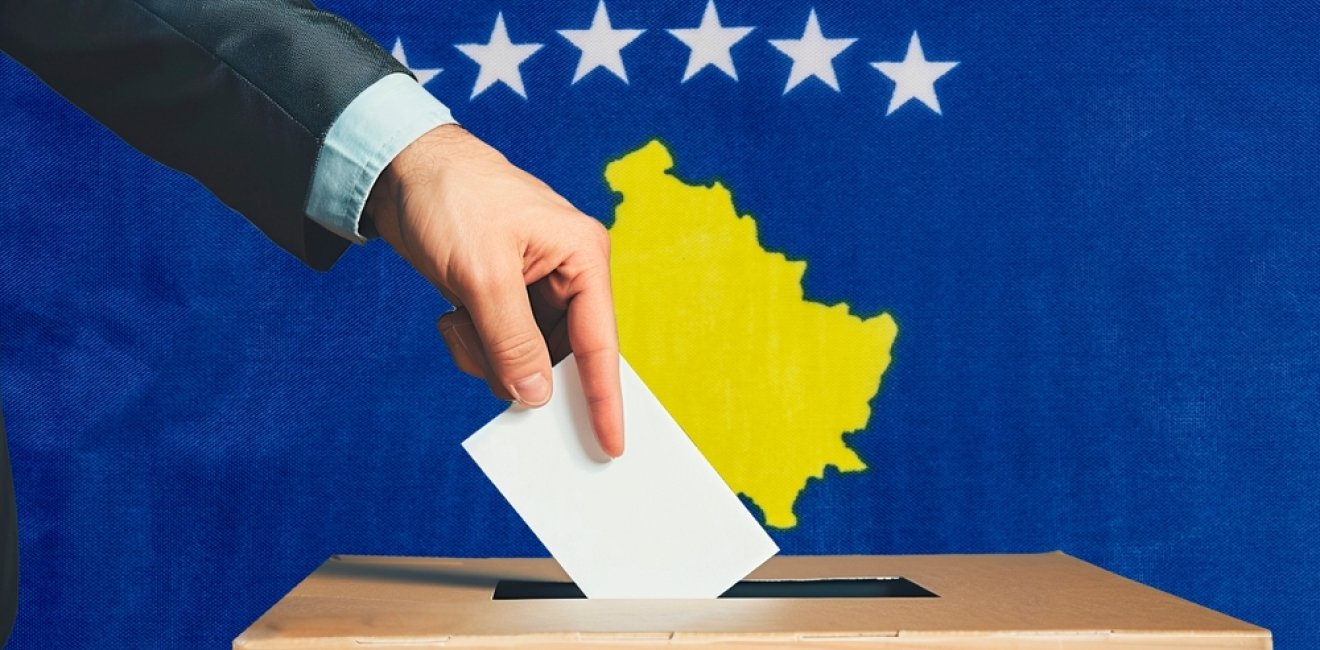The February 9 parliamentary election in Kosovo was a historic milestone, marking the first time–since the country declared independence in 2008–that a government completed its full four-year mandate. The ruling party, the Self-Determination Movement led by current Prime Minister Albin Kurti, has been in power since 2021, after securing a majority of 50.3%.
Although the Self-Determination Movement won the election again, the preliminary results indicate a decline in support for the ruling party. This time around it was only able to secure 41% of the vote. The main opposition parties, the Democratic Party of Kosovo (PDK) and the Democratic League of Kosovo (LDK) secured 22% and 18% of the vote, respectively. The fourth-place party, the Alliance for the Future of Kosovo (AAK), which ran in a party-coalition, received 7%.
Some of the factors attributed to the loss of votes for the Self-Determination Movement include unfulfilled promises made at the beginning of the term, the absence of a clear political program for the new election, and the decision to avoid participating in public debates on major national TV stations leading up to the election.
The preliminary election results indicate that a party coalition is required to form the government, placing the Self-Determination Movement in pole position to secure the necessary parliamentary majority. As a result, Albin Kurti is likely to continue serving as Prime Minister for another term. But the need for a coalition partner also means that he will no longer have free rein to govern. Another scenario could see the opposition parties–PDK, LDK, and AAK–forming a united front, although their political differences make this a challenging prospect.
The incoming Kosovo government faces major challenges, particularly the stalled progress in the Belgrade-Pristina Dialogue, which has strained relations with key allies, directly impacting Kosovo’s efforts to join international organizations and secure new diplomatic recognitions. With little margin for error, the incoming government must navigate a complex and fast evolving geopolitical landscape, meeting the EU’s expectations for tangible progress in the Dialogue, while also adapting to the dynamics of a new US administration.
The Costs of Expanding Control in the North of Kosovo
The north of Kosovo has been a source of tension and instability. Over the past four years, the Kurti government has faced criticism from both the opposition and Kosovo’s allies for its hard-line stance and uncoordinated approach in the north of Kosovo, an area predominantly inhabited by Kosovo Serbs. Under Kurti’s leadership, the government has prioritized expanding its authority and control in the north by banning the use of the Serbian dinar currency and closing parallel Serbian institutions, including postal services, tax offices, and banks. While these measures are legally grounded in Kosovo’s Constitution, the manner in which they were carried out has been perceived as hostile by the Kosovo Serb community and is detrimental to their future relationship.
Tensions peaked after the Banjska attack in September 2023 that left three Serbian attackers and one Kosovo police officer dead; it was seen as a deliberate attempt to destabilize Kosovo. The following year, Kosovo faced another incident, which damaged the Iber-Lepenc water canal, an infrastructure that supplies drinking water and supports two of the country’s main coal power plants that produce the majority of Kosovo’s electricity.
Kurti has sought to expand control in the north of Kosovo while disregarding the responsibility to establish an Association/Community of Serb-Majority Municipalities, agreed by Kosovo under the EU-facilitated Dialogue in 2013, 2015, and most recently 2023; it is considered a crucial part of the path to normalization of relations between Kosovo and Serbia. Kosovo’s closest allies, including the EU, its member states, and the United States, have criticized the Kosovo government for its lack of coordination and unilateral actions in this regard, emphasizing that the EU-facilitated Dialogue is the only viable path to integrate the local Serb community into Kosovo’s institutions. The lack of change in approach by Kurti’s government prompted the EU to impose sanctions on Kosovo in June 2023, which remain in place to this day. These measures have severely impacted Kosovo, as funding for EU projects (estimated to be around €150 million) has been paused and meetings between Kosovo and EU officials effectively halted.
EU officials have emphasized that the sanctions are “temporary and reversible,” but only if the government shifts its approach and commits to de-escalation—something that the Kurti government has not yet shown the willingness to do. However, with the Self-Determination Movement no longer holding the majority and in need of a coalition partner, there is potential for a more balanced approach. The following months will be crucial in determining whether Kosovo can rebuild trust with Brussels by changing its approach and reclaiming lost diplomatic ground.
Navigating the Fragile Relationship with the New US Administration
During Kurti’s previous term, relations with the United States deteriorated primarily due to the government’s approach in the north of Kosovo. Despite clear opposition from both the EU and the United States, Prime Minister Kurti pursued an assertive agenda, such as launching police operations against parallel Serbian institutions or attempting to open the bridge over the Ibar river for vehicles, which divides the city of Mitrovica along ethnic lines. Senior US officials at the time expressed concerns over Kosovo’s actions and the lack of coordination with Washington. This marked a shift in Kosovo’s historically strong relationship with the US, a key ally that has been instrumental in Kosovo’s progress—providing support through the war, independence, state-building, and international recognition.
Opposition parties, along with some members of civil society and the media, have criticized the deterioration of relations with the US, arguing that Kosovo’s progress is closely linked to maintaining a strong partnership with its closest ally. However, Prime Minister Kurti has dismissed these concerns, insisting that US-Kosovo relations have never been stronger. His statement prompted a response from Richard Grenell, the Special Envoy for Special Missions in the new administration, who refuted Kurti’s claims. These developments underscore the challenges the incoming Kosovo government faces in building a constructive relationship with the White House.
Another critical challenge for Kosovo is the new US administration’s unexpected decision to freeze foreign assistance. This has halted numerous projects and programs that played a crucial role in Kosovo’s democratic reform efforts. Without this assistance, the country’s progress could face serious setbacks in important areas such as energy transition, civic participation, minority rights protection, and rule of law reform.
Kosovo is also home to the largest U.S. military base in the Western Balkans, Camp Bondsteel, which has been operating since the end of the war in 1999 and is one of the main pillars of security for Kosovo. A reassessment of US military presence overseas could lead to cost reductions, potentially affecting the future of the Camp and the broader US’s military presence in Kosovo. Such changes would significantly impact the stability and security of the country.
Ultimately, the incoming Kosovo government faces serious uncertainties. Rebuilding trust with both Brussels and Washington will require diligent effort, a clear strategy and policy recalibration. The coming months will be crucial in determining whether Kosovo can regain diplomatic standing and secure the needed support necessary for long-term stability and sustainable development.
Author


Global Europe Program
The Global Europe Program is focused on Europe’s capabilities, and how it engages on critical global issues. We investigate European approaches to critical global issues. We examine Europe’s relations with Russia and Eurasia, China and the Indo-Pacific, the Middle East and Africa. Our initiatives include “Ukraine in Europe”—an examination of what it will take to make Ukraine’s European future a reality. But we also examine the role of NATO, the European Union and the OSCE, Europe’s energy security, transatlantic trade disputes, and challenges to democracy. The Global Europe Program’s staff, scholars-in-residence, and Global Fellows participate in seminars, policy study groups, and international conferences to provide analytical recommendations to policy makers and the media. Read more

Explore More
Browse Insights & Analysis
Greenland’s New Governing Coalition Signals Consensus

The Future of France's Far-Right Party

Ukrainian Issue in Polish Elections

